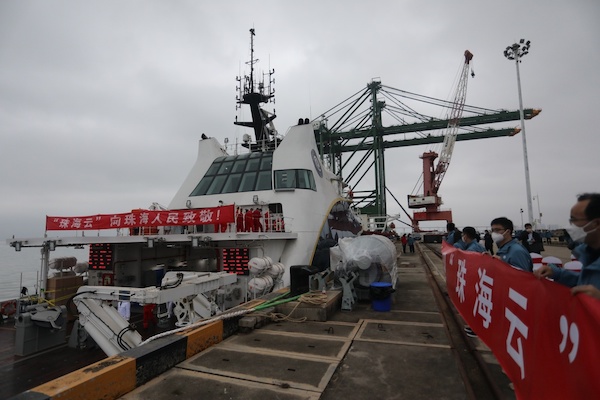World's 1st smart unmanned vessel starts operations in Zhuhai
The Zhu Hai Yun vessel, the world's first intelligent unmanned system mother ship, was put into operation at its home port in Gaolan Port on Jan 12 after completing various sea trial missions.
The vessel, subordinated to the Southern Marine Science & Engineering Guangdong Laboratory (Zhuhai), is the world's first scientific expedition vessel with remote control and open water autonomous navigation functions.
The intelligent unmanned carrier is 88.5 m (290 ft) in length, 14 m (46 ft) in width, and 6.1 m (20 ft) in depth, with a designed draught of 3.7 m (12 ft) and a water discharge volume of 2,000 metric tons. It can travel at a maximum speed of 18 knots and a cost-optimal speed of 13 knots.

Zhu Hai Yun vessel begins operation on Jan 12 [Photo by Zhong Fan / Guanhai App]
Most of the major equipment installed on the vessel was domestically produced. In addition, its power, propulsion, and intelligent systems, as well as the survey operation support systems were made in China.
Chen Dake, an academician of the Chinese Academy of Sciences and director of the Southern Marine Science & Engineering Guangdong Laboratory, said that a 12-hour sea trial for consecutive fully autonomous navigation was the first professional one for the vessel, which focused on the installation and debugging of its core equipment, intelligent system, and unmanned system.
The ship's spacious deck is able to carry dozens of air, sea, and submarine unmanned system equipment, as well as observation instruments, making it capable to be applied in offshore wind farm maintenance and submarine cable maintenance scenarios.
It is expected that the optimization of the vessel's supporting facilities will be further carried out and that the vessel will be dispatched for marine surveying and mapping, observation, as well as inspection and partial survey sampling missions in 2023.
Related
Zhu Hai Yun smart unmanned vessel begins sea trials
China's first intelligent unmanned system mother ship was launched in Guangzhou on May 18 to begin further sea trials of its core equipment, as well as intelligent and unmanned systems, with the goal of starting operations by the end of this year.



